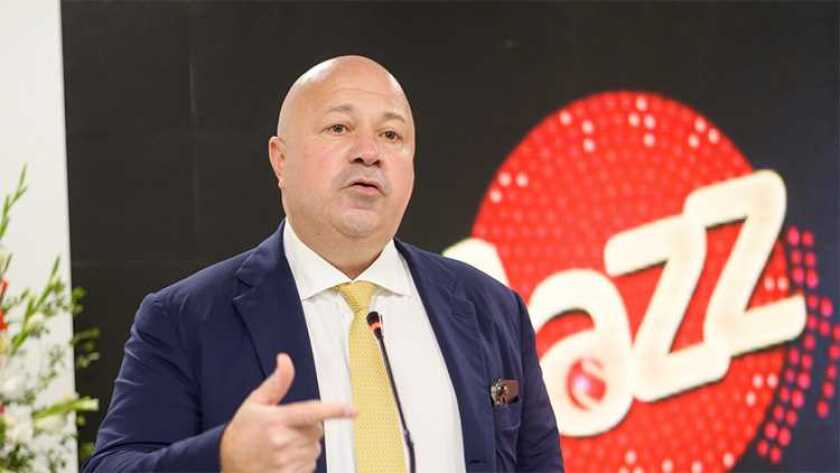This has been a difficult year for Veon. The group registered a new UK arm, Veon Holdings PLC, on 4 January 2022, saying it wanted to be in “a jurisdiction with high standards of corporate governance”, and set up its head office in London, just around the corner from the Fortnum & Mason store.
A few weeks later, Russia – the source of 52% of Veon’s revenue – invaded Ukraine – the source of another 13% of Veon’s revenue. That means almost two-thirds of Veon’s revenue, by 2021 figures, come from two countries at war with each other.
So how does Kaan Terzioğlu manage to run the group? “Well, that’s what makes the job interesting,” he says. “But we deal with the world as it is, not as we wish it was, right?”
Terzioğlu says about a third of Veon’s subscriber base “is in Russia and Ukraine”.
“We are the number one operator with almost 50% market share in Ukraine. We serve close to 25 million subscribers.” Then adds, “This number was before, of course, the events unfolded.”
“Events”, not “war”. In Russia, it is illegal to describe the country’s unprovoked invasion of Ukraine as a “war”. In July, a Moscow city councillor, Alexei Gorinov, was jailed for seven years for doing so. He could have got 15 years.
So, during our interview Veon’s CEO is careful, and never uses the word “war” at any time. Even as he pays tribute to the employees of Kyivstar, Veon’s Ukraine unit.
Terzioğlu says that between 10% to 11% of Kyivstar’s staff are “already outside of the country” – that would be refugees from the war – while the rest are “working and continuing to deliver the jobs that they do from the locations they are in”.
Kyivstar’s staff have kept 90% of the operator’s radio access network up and running, he says. “And our core is still functioning 100% as well.”
Terzioğlu praises his team in Ukraine for doing “a phenomenal job”, in the face of grave risks. “Unfortunately, we lost one engineer, and one [was] unaccounted for, for a while,” he tells me. “It is a tragedy.”
“All our offices are turned into shelters for humanitarian needs. Not only for our employees, also for the public as well,” he says. But he is careful to not say that the “humanitarian need” is protecting innocent citizens from Russia’s bombs and artillery.
When I ask if Veon’s operations in Russia are facing problems, Terzioğlu reply is philosophical and diplomatic. “The difficulties that we face – our team faces – in Russia are nowhere near the difficulties and the challenges and the tragedy that our team faces [in Ukraine]. So, we need to keep that in mind.”
Russian 5G
I ask Terzioğlu about reports that Russia, now isolated from many global suppliers, is forming its own 5G research group with the country’s main operators – one of which is Veon’s subsidiary, VimpelCom.
Terzioğlu says “how the Russian government was planning to deploy 5G” is “a long story”, but that it wanted it to be a joint initiative.
It appears that Russia’s government got its wish. In June 2021, MegaFon, Rostelecom and VimpelCom formed the New Digital Solutions joint venture to develop 5G in Russia, after receiving the nod from Russia’s Federal Antimonopoly Service the previous month. At the time MTS, which is owned by Russian industrial group Sistema, launched its own 5G pilot project in St Petersburg. Now MTS has joined the JV, and each holds a 25% stake.
“Having said that, in a country like Russia and the current conditions with export controls, I think it makes obvious sense that the operators work together, share their networks, try to find solutions to the market, which will be optimal from their dynamic,” says Terzioğlu.
Exit from three markets
“Current conditions”, as he puts it, are making things tough for Veon and its central management team, including the CEO.
Since he joined the group, it has exited three markets. When we spoke, it had left Armenia and Georgia; the sale of its Algerian operations was agreed later.
“We look for large populations and underserved needs,” Terzioğlu says, explaining Veon’s portfolio strategy. “Armenia and Georgia are basically beautiful markets. But they were too small for our general operating policy.”
So, what is the role for Veon’s central management team, which is based in Amsterdam? “I respect the differences and importance of agility and quick decision making, depending on the local conditions,” Terzioğlu says. “You cannot run Pakistan or Bangladesh by decisions that you make in Amsterdam, or the products that you will have in London.”
This policy is a 180° change from Jean-Yves Charlier’s time as CEO. Charlier, who left in 2018, tried to centralise by having a development team in London despatch results across Veon’s empire.
When Charlier left, Ursula Burns, the former Xerox head who was the company’s chairman, appointed Terzioğlu and Sergi Herrero as joint chief operating officers, and then co-CEOs. Herrero left two years ago. And, when Burns departed, Terzioğlu became group CEO.
During his tenure, Terzioğlu has faced the Covid-19 pandemic – perhaps an ideal enabler for delegating – and now is dealing with a war between his two biggest markets. But he looks at what Veon has, not at what’s lost.
“We have freedom, freedom of thinking, freedom of creativity and innovation,” he says.






